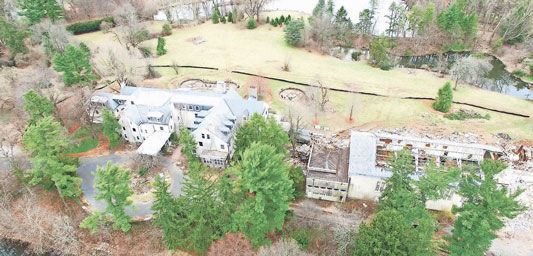By today, the Hillsborough home of former home of tobacco heiress Doris Duke may well be history.
The quixotic crusade of opponents to block demolition of the 65,000-square-foot home was dealt what appear to be knockout blows this week in the legal struggle that has kept the Duke Farms Foundation from proceeding with the work it first sought last June.
On Friday afternoon, March 18, appellate court judges denied the request for a continued legal hold on the demolition of the home. An order signed Judge Douglas Fasciale denied the motion — which sought to keep the stay in place until an appeal could be heard by the court — “for failure to demonstrate a reasonable probability of ultimate success on the merits.’”
Opponents of the demolition immediately filed a request with the state Supreme Court for the same temporary stoppage. On Monday, Justice Lee Solomon issued a denial.
The rulings clear the way for demolition to resume. Michael Catania, executive director of Duke Farms, said Tuesday that work would resume “as quickly as possible.” Contractors who began the job March 5 had been reassigned and would need to be called back, he said.
“Every day the litigation continues is a day the public cannot access that part of the property,” said Mr. Catania. “Every dollar spent on this misguided litigation is one less dollar that could be used to make Duke Farms a better place.”
Following a Superior Court decision on March 4, Duke Farms began the demolition the next day. Work was stopped by a court order issued after midnight and delivered early Sunday morning, March 6.
Aerial photos taken by the opposition group on March 13 showed most of the demolition damage to the newer “Hollywood wing” of the house, and not its older core.
David Brook, attorney for the group trying to stop the demolition, said Tuesday his side would continue its legal appeal to the Supreme Court of the October decision of the township Historic Preservation Commission to allow the demolition to proceed.
However, there is no legal barrier to Duke Farms from proceeding with the demolition while the Supreme Court proceeding is pursued.
Mr. Brook said March 11 that he emailed Jeffrey LaRosa, the attorney for Duke Farms, to ask if Duke Farms would postpone further work pending an appeal. Mr. Brook said his side would agree to an expedited schedule on the matter.
The main incentive to accept the offer, Mr. Brook said, was that, if the opponents prevailed, it would demand the house be rebuilt at Duke Farms expense “stone by stone.”
Duke Farms had its right to demolish the former home — which has been closed since the 1994 and mothballed for at least 10 years—upheld March 4 when Judge Ciccone rejected the opposition group’s request for a township commission to rehear the application that allows the demolition of what the opponents claim is a historic structure within the 2,500-acre estate in northern Hillsborough.
Duke Farms applied in June for a demolition permit. After three hearings, the Historic Preservation Commission ruled, 6-1, in October to allow the process to apply for the permit to proceed. Duke Farms was granted the permit in February, but held off the final demolition until the court case was decided. The foundation has contracted with a company that has been “salvaging” items like mantels, fixtures and woodworking and selling them on the Internet.
Mr. Brook, representing the group DORIS, an acronym for Demolition Of Residence Is Senseless,
Duke Farms Foundation wants to raze the 65,000-square-foot building and open that part of the property to the public. Duke Farms maintains the residence doesn’t have a role in its mission of environmental sustainability and preservation.
Mr. Catania said last week that Duke Farms intends to erect interpretive signs and “leave some vestiges of the building,” like bluestone terraces and the building’s stone walls that are both part of the foundation and near the house.
The roughly 50 acres around the house will be ultimately be opened to the public, he said, especially from a back entrance off the Raritan Borough side of the property.
Mr. LaRosa told the judge Feb. 26 that the house was not the Duke Mansion that owner James Buchannan Duke (Doris Duke’s father) had envisioned (a larger home was started elsewhere on the property, but was abandoned and its foundation is now a place to visit on the estate).
Mr. Duke had bought a Civil War-era farmhouse in 1893 and expanded and renovated it several times over the decades. Duke Farms’ historical expert Emily Cooperman testified that the overlapping and even contradictory work made the house an architectural “pastiche” with little significance.

